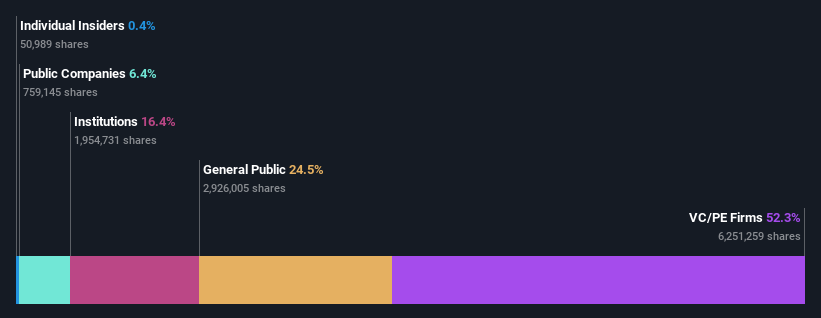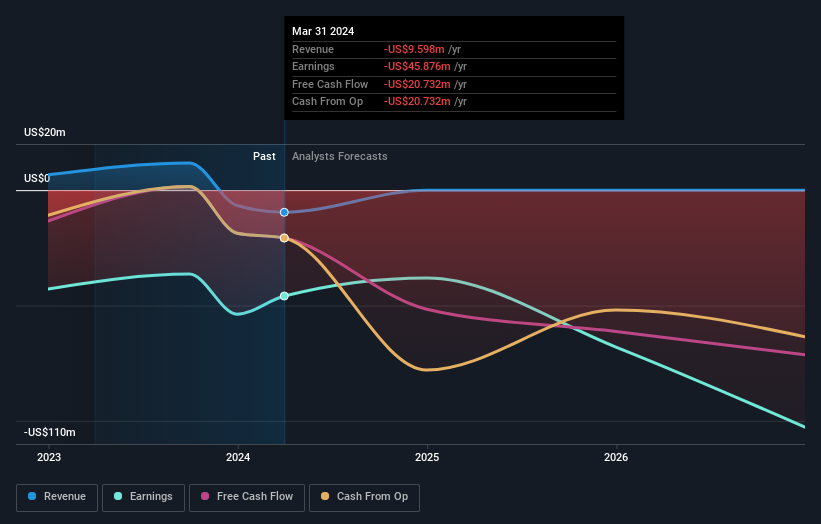Q32 Bio Inc.'s (NASDAQ:QTTB) last week's 15% decline must have disappointed private equity firms who have a significant stake
Key Insights
Q32 Bio's significant private equity firms ownership suggests that the key decisions are influenced by shareholders from the larger public
A total of 4 investors have a majority stake in the company with 52% ownership
Every investor in Q32 Bio Inc. (NASDAQ:QTTB) should be aware of the most powerful shareholder groups. The group holding the most number of shares in the company, around 52% to be precise, is private equity firms. Put another way, the group faces the maximum upside potential (or downside risk).
And last week, private equity firms endured the biggest losses as the stock fell by 15%.
Let's take a closer look to see what the different types of shareholders can tell us about Q32 Bio.
See our latest analysis for Q32 Bio
What Does The Institutional Ownership Tell Us About Q32 Bio?
Many institutions measure their performance against an index that approximates the local market. So they usually pay more attention to companies that are included in major indices.
Q32 Bio already has institutions on the share registry. Indeed, they own a respectable stake in the company. This implies the analysts working for those institutions have looked at the stock and they like it. But just like anyone else, they could be wrong. When multiple institutions own a stock, there's always a risk that they are in a 'crowded trade'. When such a trade goes wrong, multiple parties may compete to sell stock fast. This risk is higher in a company without a history of growth. You can see Q32 Bio's historic earnings and revenue below, but keep in mind there's always more to the story.
Hedge funds don't have many shares in Q32 Bio. Looking at our data, we can see that the largest shareholder is OrbiMed Advisors LLC with 19% of shares outstanding. Atlas Venture L.P. is the second largest shareholder owning 18% of common stock, and Abingworth LLP holds about 9.2% of the company stock.
On looking further, we found that 52% of the shares are owned by the top 4 shareholders. In other words, these shareholders have a meaningful say in the decisions of the company.
While it makes sense to study institutional ownership data for a company, it also makes sense to study analyst sentiments to know which way the wind is blowing. Quite a few analysts cover the stock, so you could look into forecast growth quite easily.
Insider Ownership Of Q32 Bio
The definition of an insider can differ slightly between different countries, but members of the board of directors always count. The company management answer to the board and the latter should represent the interests of shareholders. Notably, sometimes top-level managers are on the board themselves.
I generally consider insider ownership to be a good thing. However, on some occasions it makes it more difficult for other shareholders to hold the board accountable for decisions.
Our data suggests that insiders own under 1% of Q32 Bio Inc. in their own names. It has a market capitalization of just US$176m, and the board has only US$753k worth of shares in their own names. Many investors in smaller companies prefer to see the board more heavily invested. You can click here to see if those insiders have been buying or selling.
General Public Ownership
With a 25% ownership, the general public, mostly comprising of individual investors, have some degree of sway over Q32 Bio. While this group can't necessarily call the shots, it can certainly have a real influence on how the company is run.
Private Equity Ownership
With a stake of 52%, private equity firms could influence the Q32 Bio board. Some investors might be encouraged by this, since private equity are sometimes able to encourage strategies that help the market see the value in the company. Alternatively, those holders might be exiting the investment after taking it public.
Public Company Ownership
It appears to us that public companies own 6.4% of Q32 Bio. It's hard to say for sure but this suggests they have entwined business interests. This might be a strategic stake, so it's worth watching this space for changes in ownership.
Next Steps:
It's always worth thinking about the different groups who own shares in a company. But to understand Q32 Bio better, we need to consider many other factors. Take risks for example - Q32 Bio has 4 warning signs (and 2 which don't sit too well with us) we think you should know about.
Ultimately the future is most important. You can access this free report on analyst forecasts for the company.
NB: Figures in this article are calculated using data from the last twelve months, which refer to the 12-month period ending on the last date of the month the financial statement is dated. This may not be consistent with full year annual report figures.
Have feedback on this article? Concerned about the content? Get in touch with us directly. Alternatively, email editorial-team (at) simplywallst.com.
This article by Simply Wall St is general in nature. We provide commentary based on historical data and analyst forecasts only using an unbiased methodology and our articles are not intended to be financial advice. It does not constitute a recommendation to buy or sell any stock, and does not take account of your objectives, or your financial situation. We aim to bring you long-term focused analysis driven by fundamental data. Note that our analysis may not factor in the latest price-sensitive company announcements or qualitative material. Simply Wall St has no position in any stocks mentioned.
Have feedback on this article? Concerned about the content? Get in touch with us directly. Alternatively, email editorial-team@simplywallst.com

 Yahoo Finance
Yahoo Finance 

